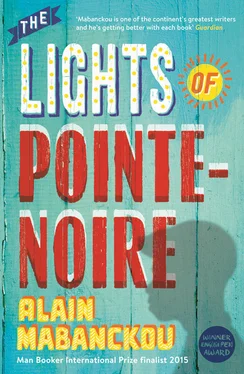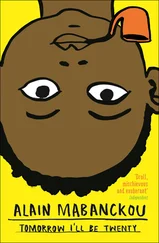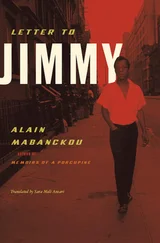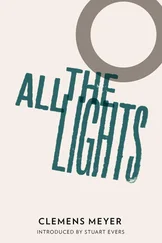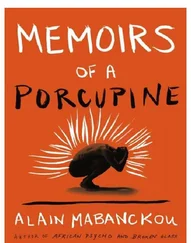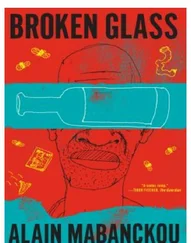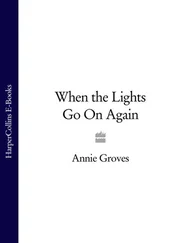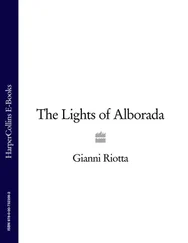There was a general murmur of discontent. Everyone wants to express their exasperation in the face of this injustice. They wait for my reaction.
I reassure them:
‘Tomorrow I’ll go to the land registry office and ask them to come and remeasure the dimensions of this plot. We can’t let them get away with it, it’s robbery!’
A storm of applause greets my remarks. Only Kihouari doesn’t join in, surprisingly, since I was sure he would be in favour of my plan.
He gives me a nod and we move away from the group to a corner of the plot, just behind the hut. His face is very serious now. He puts his hand on my left shoulder.
‘ Please don’t do what you’re planning tomorrow…’
‘What do you mean?’
‘Don’t go to the land registry office…’
‘Are you kidding? They’re stealing square metres from us, and you want to let it go? Tell me the truth now: have the neighbours been slipping you money?’
‘No, absolutely not! How can you think such a thing! Would I, Kihouari, sell off part of my own aunt’s land?’
‘Well, what’s the problem, then?’
He’s silent for a moment, looking over at the rest of the family. The group is getting gradually smaller. Some people are starting to leave, others are watching us, wondering what we are cooking up, over by the old shack.
Kihouari clears his throat:
‘I think I had better tell you something very important, you seem out of touch with reality since you moved away…’
I had never seen him look so serious. The death of his mother, Dorothée Lohounou — another of my mother’s older sisters — must have brought him face to face with his responsibilities: as the oldest of a dozen or more sisters and brothers, he had had to become wise before his time.
‘These neighbours you want to go for, they’re a bit like our family too. The owner, Monsieur Goma, died one year after Aunt Pauline Kengué. Monsieur Goma’s wife got kicked out like a sick dog by the brothers of the deceased. As for the children, they are scattered in their mother’s village. Two of them, Anicet and Apollo, live in France and London, and no one ever hears from them. They must be about your age, you used to play together in our yard and theirs. You even used to eat at their house, and sometimes they came and ate at ours. Now the younger brother of the late Monsieur Goma looks after their plot. He’s a bit strange, it’s true, but even so, it’s thanks to him that the plot hasn’t been sold by the same people who threw out the widow and wanted to get their hands on the inheritance and disinherit the children! I respect him for that if for nothing else. Did you notice he dropped by to say hello and insisted on appearing in the photos we took when you arrived? His name is Mesmin, he knew you when you were a boy, that was his way of showing you he was practically a member of the family. So what would be the good at this stage of having a confrontation before the tribunal? You’re going to go back to Europe, or America, and you’ll leave us with hot potatoes in our hands. When we leave this life we leave whatever we owned on earth, why get into a fight over it now…?’
I am speechless. Kihouari goes back to join the family, and I stand there staring at the little hut.
I walk around the shack and trip over some stones propped up against the main façade. They used to be the two entrance steps. The seasons have worn them away, leaving just this scattered debris, which no one dares move, out of respect for my mother’s memory. The old slats of wood, bound by a kind of unshakeable solidarity, hold together, defying time. On the left, by the only window, I notice some bits of wood and plank that must have broken off with wear and tear. It wouldn’t occur to anyone to make a fire with them, they’re used to prop up the corners, to stop the shack falling down for as long as possible. Strings and pieces of wood positioned on the sheet metal keep the roof in place. The main door has been eaten away at the bottom by termites.
Yes, I used to sleep there. My dreams were less confined than the space we lived in. At least when I closed my eyes and sleep lent me wings to fly, I found myself in a vast kingdom, not in a shack that looks today like a fisherman’s hut straight out of The Old Man and the Sea , or even The Old Man Who Read Love Stories .
I’ve been so concerned with the shack, I’ve overlooked a solidly built structure on the plot, with three little studios attached. Two are occupied by tenants, and the third by Kihouari’s little brother, his wife and three children.
Kihouari comes up behind me:
‘Aunt Pauline Kengué began the work on the solid structure… At the time she died there were only the two studios, we added the third…’
The day is almost over. A taxi draws up outside the plot. Uncle Jean-Pierre Matété called for it. I’m just about to climb in, when I feel once more the presence of Kihouari at my back.
‘Brother, the old shack is a disgrace to the family, we’re going to pull it down and put something else in its place…’
I give him a furious look.
‘No way! I’m going to restore it, the place is meaningless without the shack…’
Before getting into the car I add:
‘It’s my mother’s castle…’
He looks at me pityingly, unable to understand why I should be more interested in the hut than in the solid structure, of which he is visibly proud. He’s almost disappointed in me when I conclude:
‘The one I’m going to pull down is the solid building, I’ll replace it with another one… I will start work next year.’
The taxi sets off, and Uncle Mompéro, Uncle Matété and Grand Poupy wave goodbye from a distance. I’ll be back one day…

I’m wandering through the Voungou neighbourhood in the late afternoon. Maybe in search of clues to remind me of my childhood games. Occasionally I stand still for a few seconds and close my eyes, sure I don’t need them to see the true face of the things jostling about in my mind, their contours blurred with time. Passers-by can sense I’m not local — or am no longer. Who, besides the town madmen, would dare stand around, for example, gazing at a pile of rubbish, or the carcass of an animal, getting emotional over the clucking of a hen, perched, inexplicably, on a table in the empty market?
The family members I saw yesterday at our reunion don’t know that I am only two hundred metres from my mother’s property, like a criminal returning to the place of the crime to reassure himself that he made no mistakes, or to erase any clues that might lead the investigators to his door. If they saw me, they would improvise another party, with empty chairs in memory of my parents.
So I take the small backstreets, with my cap jammed right down to the top of my eyebrows. Just as I reach an intersection and let two taxis go by before crossing the marketplace, I hear a female voice call me from somewhere ahead:
‘Little brother! Hey, little brother!’
I look up, and try to hide my surprise: it’s Georgette.
She’s standing at a pavement table outside a small bar. She is number two of the eight children my father had with my ‘second mother’, Maman Martine. I can see Yaya Gaston behind her, too, sitting at a table with a bottle of Pelforth. He’s wearing sunglasses and the orange overalls you see on the men who work in the warehouses down at the seaport of Pointe-Noire. His is scruffy, stained with black grease marks. It looks like he never takes it off, and wears the same outfit for work and around town. He waves me over to join them.
Читать дальше
